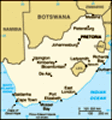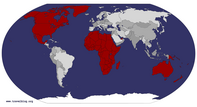Advertisement

 Covid-19
Covid-19
42nd Street, New York. Eerily empty.Bloomberg reports that since Covid-19 made its unwelcome arrival, almost 2500 studies have been written on this virus. So, that means a whole bunch of epidemiologists, scientists, doctors and sadly, even politicians, have been furiously pounding their electronic devices spewing forth their version of something that has humanity mystified. A step back and view of reality indicates that we still don’t really know where and how it all started, why it spread so rapidly to even the most distant corners of the planet, why it doesn’t seem to affect children and how this pandemic will play out and end. Despite this huge number of expert studies, Covid-19 has the World in a vice-like grip of panic, fear and confusion. Somehow there is a perception that, as many countries start to ease restrictions to save economies, the first wave has been “dealt with.” This is not the case as we are nowhere near living after this pandemic. We are right in the middle of it.
Let’s not forget there are three types of lies- lies, damn lies, and statistics. The

 Covid-19
Covid-19
Red Square, Moscow.WHO dashboard has the following updated numbers as at 9.10am on 10
th May 2020 (SA numbers in brackets).
Global confirmed cases: 3,884,434 (9,420) Global deaths: 272,859 (186) Globally, the number of daily cases as indicated on the WHO graph remains constant, whilst the number of deaths is showing a declining trend. In South Africa the graphs indicate a gently sloping upward curve for both measures.
The headlines on various media platforms are increasingly focusing on the disastrous economic impact which could be more devastating than the virus itself. The picture here in South Africa is bleak with massive job losses having already taken place, small companies likely to fall over at a rate of one in two, huge shortfalls in tax collections. The list goes on and on. The early shoots of an uprising by the poor and socially disadvantaged must keep CR and his cohorts awake at night (and probably many of us citizens). Daily, one sees massive food hand out queues across the country with people openly defying social distancing rules and reports of people dying due to starvation. Civil society, business lobbies openly beseeching CR and his “Command Council” to heed these very

 Covid-19
Covid-19
WFH. Plus a healthy dose of multi tasking!real signs of looming disaster and to accelerate relaxing overly rigid lock down regulations to save the country from something far worse than Covid-19. After all, they have now had 6 weeks to “prepare” the countries medical infrastructure to deal with massive infection and death rate projections ( which, to date, have not materialised) and if this “Command Council” is tapping into global trends and views, there is a growing narrative suggesting a lock down does not necessarily slow the spread of the virus. It is now all about a delicate balancing act between saving lives and livelihoods.
No point banging on about all these Covid-19 theories and unknowns. There are two equally important topics which are providing futurists, scenario planners and the like with plenty of literary ammunition viz.,
when and how will this pandemic play out and what will the future of work look like? Anyone who felt earlier this year that this virus would be short lived with minimal human disruption has had to have had a serious attitudinal reset. This includes Donald Trump who initially tried to swot it all away like an irritating insect. In the bigger scheme of things, he just could

 Covid-19
Covid-19
All play with a touch of work.not afford an economic hiccup given the elections at the end of the year. This virus is a proper “game changer” which will have a long-term impact on many aspects of our existence. Will the medical profession be seen as more important than military prowess by attracting massive investment to improve existing health systems and readiness for future viruses? Those first world countries that can afford to, are throwing massive amounts of “created” money to mitigate the economic impact. Does this not fly in the face of economic theory and is it not creating a massive financial bubble which, as bubbles do, bursts down the line? A simple extrapolation of what is happening is to compare these Government inspired bail outs with a corporation which is heavily in debt. At some point they cannot service the debt and bang, game over. The same reality applies to millions of individuals heavily in debt.
At present the virus continues to spread albeit at a slower rate in many countries. A whole drop-down list of preventative measures and behaviours are being observed, but this does not mean the virus will just melt away. Frantic work continues as bio pharmaceutical companies try to find both a vaccine and a cure. Both are elusive at present. Best guesses are that maybe something will have been developed and tested within the next 12-18 months.
The tapestry currently, and for some time into the future, shows deserted mega cities which means millions of people have adapted and are working from home (WFH). Not long ago, this trend was already underway but there was a view that the work effort from home would not square up with that in an office environment. The opposite seems to be the case with a number of reports indicating that people are being more productive working from home. So, this may be a positive tick but there are always consequences and one wonders what will happen to massive office block complexes as huge corporates start to reduce their office footprint. Property companies must be hugely concerned at their looming vacant buildings. They are heavily indebted, so the banks come into this equation. On a micro scale, what about the little niche coffee shops, pubs and restaurants who have a symbiotic relationship with all these office occupants?
Travel in the future will be vastly different. The old adage of “I’ll just hop on a plane and…” will be replaced with “do I really want to share that confined space…?” Already here in SA, two airline casualties are in the public domain. Actually, three, if one adds SAA, which I suspect has been disconnected from the life support machine it has been attached to for at least ten years. Supply and demand always dictate pricing and if we have three fewer airlines, a further question is; will anyone be able to afford flying? If one then unravels the virus impact further down the travel chain, and there are restrictions on travel across provinces or to hot spots, what happens to the taxi industry, Uber and even rail transport? One industry which must be on the verge of disaster is car hire. Thousands of cars for hire parked at airports and city pick up points and not a customer in sight.
Tourism contributes close to 10 percent of our annual GDP. It has all but collapsed with many small operators going to the wall and thousands losing their jobs. Even if the virus were to miraculously disappear, it will take some time for global travel and tourism to return to the old “normal.”
Vladimir Lenin, founder of the Soviet Union, made a prophetic statement: “
there are decades when nothing happens and then there are weeks when decades happen.” Sums up Covid-19 to a tee.
What could be some of the positives that emerge sometime in the future when this virus is tamed and disappears? Adrian Gore CEO of Discovery had some excellent ideas in this regard, Firstly, maybe there will be a greater collective “we” in the future as nations finally realise that we are in this thing together. It is a force which may just entrench global solidarity and he states “a World of We is much better than a World of I.” His second point is that South Africa has been lauded by the international community for the manner in which CR responded to the crisis. If esteem is managed well it could lift our optimism and the country comes out in a stronger form with emphasis on the economy. Thirdly, he stresses that science and fact have been lost along the way with the unfolding of Covid-19. Too many theories advanced by people not suited have added to confusion and mistrust. Maybe it won’t be patriots and soldiers who are future heroes, but a new breed of scientific experts capable of producing real facts.
He paints a picture of an “online world” citing how health care and telemedicine will dramatically escalate in the digital space. It will affect many facets of both work and home life in unimaginable ways. His final and most profound point is that “the tyranny of habit” is going to disappear. Life has more authenticity than simply chasing time in a work context. People are realising that connections with family, time at home have real value. He sums up:
“with concern, caution, prudence and with some amount of grief we’ll muddle our way through and pop out on the other side. I do think that the world will be better post Covid-19 hopefully, than it’s been pre Covid-19.”
Advertisement
Tot: 0.274s; Tpl: 0.011s; cc: 9; qc: 49; dbt: 0.1096s; 1; m:domysql w:travelblog (10.17.0.13); sld: 1;
; mem: 1.2mb











John Wilson
non-member comment
Tim, thanks for this summary and interesting closing view from Adrian Gore, whose intellectual talent is undoubted in my view. What continues to concern me is the amount of fake news and how gullible we are as humans, happy to blindly accept he opinions of people we do not know and who in fact often have their own agenda, and if that is not enough to then pass it on to our circle as if we endorsed it! The result is that it is nearly impossible to determine what is true and what is not, and the world cannot operate like that on a sustainable basis - how does this get addressed? Thanks John